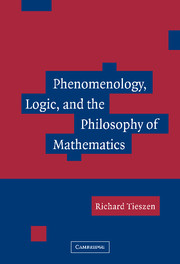Book contents
- Frontmatter
- Contents
- Acknowledgments
- Introduction: Themes and Issues
- PART I REASON, SCIENCE, AND MATHEMATICS
- PART II KURT GÖDEL, PHENOMENOLOGY, AND THE PHILOSOPHY OF MATHEMATICS
- PART III CONSTRUCTIVISM, FULFILLABLE INTENTIONS, AND ORIGINS
- 11 Intuitionism, Meaning Theory, and Cognition
- 12 The Philosophical Background of Weyl's Mathematical Constructivism
- 13 Proofs and Fulfillable Mathematical Intentions
- 14 Logicism, Impredicativity, Formalism: Some Remarks on Poincaré and Husserl
- 15 The Philosophy of Arithmetic: Frege and Husserl
- Bibliography
- Index
14 - Logicism, Impredicativity, Formalism: Some Remarks on Poincaré and Husserl
Published online by Cambridge University Press: 14 July 2009
- Frontmatter
- Contents
- Acknowledgments
- Introduction: Themes and Issues
- PART I REASON, SCIENCE, AND MATHEMATICS
- PART II KURT GÖDEL, PHENOMENOLOGY, AND THE PHILOSOPHY OF MATHEMATICS
- PART III CONSTRUCTIVISM, FULFILLABLE INTENTIONS, AND ORIGINS
- 11 Intuitionism, Meaning Theory, and Cognition
- 12 The Philosophical Background of Weyl's Mathematical Constructivism
- 13 Proofs and Fulfillable Mathematical Intentions
- 14 Logicism, Impredicativity, Formalism: Some Remarks on Poincaré and Husserl
- 15 The Philosophy of Arithmetic: Frege and Husserl
- Bibliography
- Index
Summary
Poincaré is well known for claiming that logicist and formalist attempts to provide a foundation for mathematics are misguided. He is also known for holding that any mathematical results that depend on viciously circular impredicative definitions are illusory. In Poincaré's work these views are linked to a form of constructivism about the natural numbers, to the idea that it is appropriate to reason about only those objects that can be defined in a finite number of words, and to the related idea that in order to be meaningful mathematical theorems must be finitely ‘verifiable’. Poincaré's arguments on these matters have been influential, and I believe we can still profit from thinking about them today. My own viewpoint on the foundations of mathematics has been influenced by Husserlian transcendental phenomenology, but I find that Poincaré and Husserl have similar positions on a number of general epistemological issues, and that some of their views reinforce one another.
In this chapter I shall discuss Poincaré's views on logicism, impredicativity, and formalism from the perspective of some central themes of Husserl's transcendental phenomenology. Among the most important themes in phenomenology are that mathematical cognition exhibits intentionality, and that the meaning and reference of mathematical propositions must be understood accordingly. This is accompanied by the view that there are various ‘meaning categories’ in our thinking, and corresponding ‘regional ontologies’.
- Type
- Chapter
- Information
- Phenomenology, Logic, and the Philosophy of Mathematics , pp. 294 - 313Publisher: Cambridge University PressPrint publication year: 2005
- 1
- Cited by



